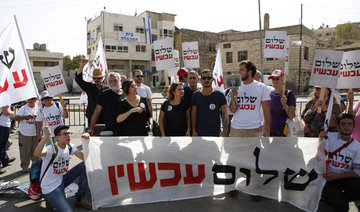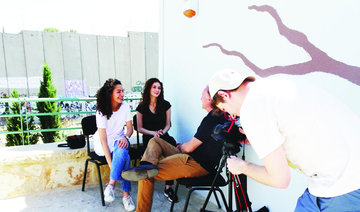LONDON: The Palestinian Ambassador to the UK said it was time for the government to “walk the walk” in supporting a two-state solution.
While the UK claims to support such a plan for the Israel-Palestine conflict, successive governments have failed to follow-through, said Palestinian Ambassador to the UK, Manuel Hassassian.
“They have the right lexicon when it comes to the peace process, but I always say ‘You talk the talk, but you don’t walk the walk,’’’ he told Arab News in an exclusive interview in London.
While lauding UK Department for International Development funding that supported infrastructure and security projects that help the Palestinian people, Hassassian said that Downing Street’s refusal to recognize the nation of Palestine threw into question its commitment to the two-state solution.
“It’s not enough in my opinion just to say you are for a two state solution,” he said. “Show me you are for a two state solution. When you recognize the state of Israel but you don’t recognize the state of Palestine, how could you justify saying you are for a two-state solution?” he asked.
He added that 137 of the UN’s 193 member states recognize the State of Palestine.
The ambassador believes that the double-speak is wearing thin – particularly as the government gears up to mark the 100th anniversary of the Balfour Declaration on Nov. 2.
The document promised British support for a national Jewish homeland in Palestine with the provision that “nothing shall be done which may prejudice the civil and religious rights of existing non-Jewish communities in Palestine.”
Downing Street has refused to apologize for the Balfour Declaration, reaffirming instead that it was “proud of its role” in creating the State of Israel –while at the same time seeking to contextualize the document as a historical artefact.
Hassassian, however, vehemently disagreed. “The displacement of the Palestinians is a result of that document,” he said, adding that it was used as legal evidence for creating the “British Mandate for Palestine,” from which the State of Israel was born.
The consequences of the Balfour Declaration, Hassassian said, are felt in the daily lives of Palestinians living under occupation.
“The United Kingdom cannot exonerate itself from the moral and historic responsibility of such a document that had repercussions on the fate and destiny of Palestinians,” Hassassian insisted.
The British government is marking the 100th anniversary of the Balfour Declaration by holding a private reception with Israeli Prime Minister Benjamin Netanyahu as the guest of honor.
“For me it’s a slap in the face,” Hassassian said of the scheduled commemoration.
In light of the centenary, the Palestinian Mission to the UK has called upon the British Government to recognize the State of Palestine and correct the “historical and ongoing wrongs” suffered by the Palestinian people.
Hassassian said that Downing Street’s rhetoric around its concern for the suffering of the Palestinian people is ringing increasingly hollow.
“It is obvious they are sympathetic with the Palestinians, but I do not think they are doing enough to put pressures on Israel,” he said.
Israel recently approved the construction of 3,000 new homes in the West Bank, according to the activist group Peace Now, despite a sharp rebuke from the international community, which considers the settlements illegal.
In 2016 the UK voted for UN Security Resolution 2334 which deemed Israel’s settlement activity a “flagrant violation under international law and a major obstacle to the achievement of the two-State solution.”
Still, the UK has not done enough to pressure Israel toward implementing the two-state solution, Hassassian added. “If you want to pressure Israel, stop trade relations,” he said.
Instead, bilateral trade deals have reached more than £7 billion between the UK and Israel. In a phone conversation earlier this month, PM Theresa May and Israel PM Benjamin Netanyahu agreed to further strengthen trade relations following the UK’s exit from the European Union.
“Netanyahu is in the driver’s seat,” Hassassian conceded. Crises in the Arab world, from the Gulf diplomatic impasse to the Syrian civil war, have edged the Palestinian issue out of the global headlines and debates, much to Israel’s benefit, he added. “Factionalism in the Arab world and what we call the Arab Spring has helped him basically to relegate the Palestinian issue as number ten in priority.”
Divisions among the Palestinian leadership, too, had hindered the peace process he acknowledged. Earlier this month, rival political groups Hamas and Fatah signed a reconciliation agreement aimed at ending a ten-year political schism.
“I always say its important that Hamas should recognize the question of Israel and the issue of disarming,” Hassassian said. “You cannot have a government with militias being in control. That doesn’t work.”
Maintaining a united front will encourage members of the international community to support the State of Palestine, he said, and the acknowledge injustices that the Palestinian people have faced since the Balfour was signed one hundred years ago.
“This historical document will cease to be as important as it is today once the occupation ends, and once we have our independence.”





























